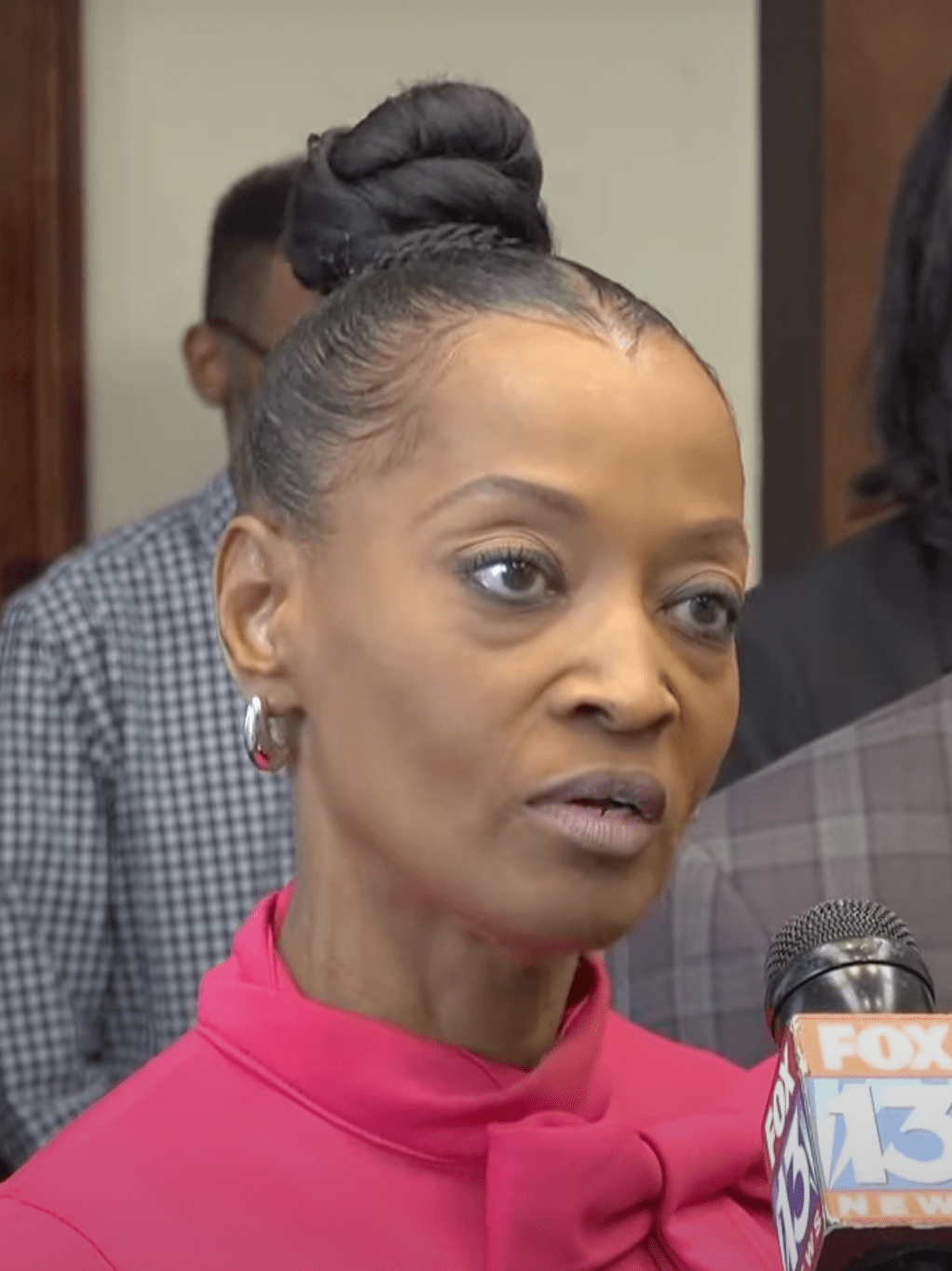State Sen. Brent Taylor took his ongoing criticism of Shelby County District Attorney Steve Mulroy a step further last month, saying he plans to file a resolution allowing the Tennessee General Assembly to vote on ousting the district attorney.
In a letter to Lt. Gov. Randy McNally outlining his plan, Taylor cited a “‘dereliction of duty’ for (Mulroy) failing to prosecute convicted felons in possession of a firearm.” To be successful, the resolution would need a concurrent vote of both chambers of the General Assembly, with two-thirds of members in each concurring. Both have Republican supermajorities.
In a news conference held June 17, Taylor would not give specific examples of instances when Mulroy has refused to prosecute broad swaths of crimes, instead referring reporters to his X (formerly known as Twitter) and Facebook pages.
MLK50: Justice Through Journalism took Taylor up on his suggestion, looking back at his comments about Mulroy and related topics on social media, in letters and in news conferences. The criticisms are often broad, and those examples that are specific — such as Mulroy not prosecuting drag shows — often lack in context.
MLK50 could not find an example cited by Taylor in which Mulroy has, of his own volition, decided not to prosecute entire types of crimes. Here, we go through some of Taylor’s most frequent criticisms of Mulroy and why they are misinformation.
Gun diversion
The background

Minutes before Taylor appeared in front of Memphis media to discuss his ouster resolution, Mulroy announced in a text that a possible gun diversion approach would not be implemented.
The approach, which appeared to be Taylor’s last straw with Mulroy, would have applied to defendants without violent criminal histories and whose gun possession charges are nonviolent, according to a statement from Mulroy’s office. It still would have charged, brought to court and punished felons found with firearms.
Taylor said he would still seek Mulroy’s ouster. On June 24, he wrote a letter to the legal counsel for the Senate Judiciary Committee saying he would require their services to research the ouster charges, and that he would “soon forward at least five charges for you.”

He did not tell MLK50 what those charges are, but said in an email that they have been submitted to the Senate Judiciary Committee legal counsel.
Online, Taylor wrote that if Mulroy does not proceed with his own ouster petition against Shelby County Clerk Wanda Halbert, he will add that “lack of action to an already growing list of charges to his own ouster.” Mulroy previously recused himself from investigating Halbert, resulting in the clerk being investigated by the Hamilton County District Attorney’s Office. That case was dismissed for lack of standing. The Shelby County Attorney’s Office, which is separate from Mulroy’s office, is now pursuing the matter.
Mulroy declined to comment for this story.
The facts
Even if the gun diversion approach had been implemented, it would have been a form of prosecution, not a failure to prosecute, as described by Taylor. It would have sought to divert nonviolent offenders from prison.
Prosecutors do have power over what sentences they choose to seek, and whether to pursue a jury trial or offer a plea bargain to a defendant.

Prosecutorial discretion is something used by every prosecutor, said Rachel Marshall, executive director of the Institute for Innovation in Prosecution at John Jay College of Criminal Justice. The concept is “fundamental to our legal system, that prosecutors are afforded wide latitude in making decisions about when, if and how to prosecute individual cases,” Marshall said.
No prosecutor could prosecute every case brought to them, Marshall said. They must consider limited resources, what will promote long-term public safety and whether a case is just and legal.
Taylor’s claims
Taylor has broadly mischaracterized Mulroy’s treatment of nonviolent felons with weapons, saying at the news conference, “The people through their elected representatives have decided that felons are not allowed to have firearms, and he sought through his diversion program to redefine that statute, and that is not his lane.”
Mulroy has not said that he believes felons should be allowed to have firearms.

In the news conference, Taylor again incorrectly described the diversion effort as not prosecuting those crimes. He also contradicted himself, saying his ouster resolution “is not about the diversion program” and that the ouster resolution “has to do with the diversion program.”
Taylor did broadly describe property crimes from which Memphians suffer, including car break-ins and theft from stores. When asked if Mulroy had refused to prosecute property crimes, Taylor said, “Perhaps. He certainly says it’s not a focus.”
Mulroy’s fast-track violent crime initiative includes prioritizing retail smash-and-grabs and stolen cars with simultaneous possession of a firearm.
Aggravated prostitution
The background
Taylor has also criticized an agreement between Mulroy’s office and the U.S. Department of Justice not to prosecute aggravated prostitution, which means prosecuting someone as a felon “when, knowing that such person is infected with HIV, the person engages in sexual activity as a business or is an inmate in a house of prostitution or loiters in a public place for the purpose of being hired to engage in sexual activity.”
The facts
Mulroy’s office agreed not to prosecute aggravated prostitution because it was told not to by the U.S. Department of Justice. In no longer prosecuting aggravated prostitution, Mulroy’s office is avoiding a lawsuit from the Department of Justice, which has already sued the State of Tennessee and the Tennessee Bureau of Investigation in February over the statute. That lawsuit is ongoing, meaning it is an unsettled legal matter.
Mulroy’s office will continue prosecuting prostitution as well as a separate statute that makes it a felony to knowingly expose another person to HIV, his office said in a written statement.
The aggravated prostitution statute elevates to a felony what would otherwise be a misdemeanor “solely because the individual charged knows they have HIV, regardless of any actual risk of harm,” the DOJ wrote in a December letter. That is a violation of the Americans with Disabilities Act and based on outdated views of HIV and its treatment, the DOJ wrote.
Prosecutors regularly choose not to pursue crimes that don’t align with the values of their communities, Marshall said. Many states continue to have adultery or sodomy laws, but they are unlikely to be prosecuted. More recently, some prosecutors have declined to bring cases under new abortion criminalization laws.

Mulroy’s Republican predecessor, Amy Weirich, is one prosecutor who declined to pursue particular types of cases. In 2018, her office announced it would not prosecute driving on a suspended license when the underlying suspension was for financial reasons.
Taylor’s claims
In a letter sent June 11 to Tennessee Attorney General Jonathan Skrmetti, Taylor wrote, “Despite the General Assembly and the public demanding an increase in prosecutions, our District Attorney has taken it upon himself to willfully ignore an entire category of crimes.”

Asked whether Mulroy should prosecute the statute even though the Department of Justice told him not to, Taylor said, “DA Mulroy did not have the authority to enter into that agreement (with the DOJ). … In DA Mulroy’s effort to inflict his ‘social justice’ experiment on the citizens of Shelby County, he has undermined the Tennessee Attorney General’s defense of this statute in court by illegally entering into an agreement with the Department of Justice for which he had no statutory authority to do so.”
There is no evidence that Mulroy’s agreement with the U.S. Department of Justice is “illegal.”
Friends of George’s
The background
A local LGBTQ theater group named Friends of George’s had sued Mulroy after the Tennessee General Assembly enacted a statute criminalizing “adult cabaret entertainment” in “any location where the adult cabaret entertainment could be viewed by a person who is not an adult.” The statute was widely understood to apply to drag shows.
The facts
In that instance, Mulroy was stopped by a judge from enforcing that statute.
The Court ultimately determined that the law was an unconstitutional restriction on freedom of speech and permanently enjoined Mulroy from enforcing the statute. Mulroy, represented by Skrmetti, has appealed that decision.

Taylor’s claims
In that same June 11 letter to Skrmetti, Taylor described Mulroy as having twice been “party to an action which resulted in different enforcement of laws in Shelby County compared to the rest of the state.” The first, Taylor wrote, was “Friends of George v. Mulroy, which effectively enjoined the enforcement of protecting children from sexually explicit cabaret shows in Shelby County.”
Taylor told MLK50 that he mentioned that case “as it is similar to the aggravated prostitution agreement in terms of (groups) viewing DA Mulroy as an ally to partner with to circumvent the General Assembly.”
Bail setting and reforms
The background
Taylor also objected to the implementation of a new bail system in February 2022. That system included a new bail hearing courtroom, individualized bail hearings with counsel no later than three days after an arrest and examination of a person’s financial circumstances using the Vera Institute’s “Ability to Pay” calculator.
Under the previous system, two defendants could be charged with the same crime, but one freed until trial and the other kept in jail due to inability to pay bail. The potential danger to the community if a person was released and the likelihood of that person showing up at future court dates was always a consideration of the hearing, including under the new bail system.
Taylor has also cited examples on his social media accounts of violent criminals who are released with low bail.
In an emailed response to questions from MLK50, Taylor pointed out that Mulroy appeared before the Shelby County Commission to advocate for the bail reforms. Weirich also appeared before the commission to advocate in favor of the bail reforms.
“The DA is the only person in the whole county who can argue with authority for higher bail!” Taylor wrote. “When he constantly acquiesces at this critical juncture of the criminal justice system, the adversarial nature of our justice system is eroded to the detriment of the community and, more importantly, the crime victim. This abdication of his responsibility alone should be grounds for removal from office for abuse of prosecutorial discretion.”
While assistant district attorneys can argue for higher bail, there’s no evidence that Mulroy has directed them not to. Taylor has not publicly cited an example of Mulroy doing so. And, Mulroy has suggested that he might urge judicial commissioners to set higher bails for repeat offenders, as reported by The Commercial Appeal.
The facts

Taylor often omits context about how Mulroy’s responsibilities fit into the wider justice system.
The district attorney is not responsible for setting bail. Bail in Shelby County is set by either a judge or judicial commissioner. While the district attorney does not give input into the initial bail, they might make a recommendation at the bail hearing, which occurs 72 hours later. By that time, a person may have already made bail or been released on their own recognizance.
In his response to questions from MLK50, Taylor pointed to the case of 18-year-old Jaylen Lobley, in which Mulroy misrepresented and then corrected how his prosecutor responded to a proposed $10,000 bond. Lobley was released, then participated in a shootout with Memphis police a week later. Lobley and a police officer were killed.
Marshall pointed out that it’s easy to criticize an example with the benefit of hindsight, but that “it’s not constitutional to make decisions that are solely out of fear of (something) ever happening.”
The new system was implemented while Weirich was in office and had the support of seven of the county’s nine General sessions Criminal Court judges. The policy was the result of negotiations between the judges, the Shelby County Board of Commissioners, the ACLU, Just City and others after the ACLU and Just City threatened a lawsuit.
The State Legislature has since passed a law prohibiting the consideration of a defendant’s ability to pay when setting bail. The bills were sponsored by Taylor and Rep. John Gillespie (R-Memphis). The new law still allows a defendant’s “financial consideration” to be taken into account, but no distinction is made between financial consideration and ability to pay.
That lack of distinction is “very difficult to follow” and creates “a big constitutional problem,” say opponents like Just City’s Josh Spickler, said since courts have regularly said wealth-based detention violates the Equal Protection and Due Process Clauses of the Fourteenth Amendment to the Constitution.
Since the new law’s passage, Shelby County judges and judicial commissioners have stopped using Vera Institute’s ability to pay calculator.
Taylor’s claims
In a February 26 appearance at the statehouse, Taylor said, “because we had a DA who was acquiescent and compliant, they agreed to a standing bail order that now people get out of jail based on how much money they have in their pocket, not based on the severity of the crime or the threat to the community or whether or not there’s a likelihood of that person to show back up in court.”
Partnerships with Just City, Vera
The background
Taylor has also targeted nonprofit groups such as Just City and the Vera Institute of Justice, speaking out against the district attorney’s relationship with those organizations. During the last legislative session, Taylor passed a bill requiring nonprofits partnering with district attorneys to disclose their donors upon the request of a county legislative body or a state lawmaker.
The facts
It’s not uncommon for district attorneys to partner with local groups. Vera has partnered with prosecutors’ offices in Georgia, Minnesota, Massachusetts, Virginia, Michigan, Vermont and more.
Vera also worked with Shelby County prior to Mulroy’s tenure, undertaking a study that included monthly meetings with Weirich’s office, the Shelby County Sheriff’s Office, the public defender’s office and others to consult on bail procedures. In that case, Vera was brought in by then-County Mayor Mark Luttrell, a Republican. That plan was completed in August 2019. Mulroy took office in August 2022.

Taylor told MLK50 he did not “understand the relevance” of Vera having worked with Republican leaders in the county, since “Neither Luttrell or Weirich are in office currently, and I wasn’t a senator when they were.”
Taylor’s claims
As for Just City, contrary to Taylor’s implications, the local nonprofit does not have any partnership or formal agreement with the Shelby County District Attorney’s Office at all, said Spickler, Just City’s executive director.
What is misinformation?
Merriam-Webster defines misinformation as “incorrect or misleading information.” The definition of disinformation goes a step further: “False information deliberately and often covertly spread in order to influence public opinion or obscure the truth.”
Opponents to local elected officials need to stop “cherry picking individual cases” and falsely conflating roles of different people in the justice system, Marshall said.
“This (ouster) isn’t really about a fundamental concern about prosecutorial discretion; it’s really about a political, partisan disagreement with the approaches some prosecutors have been taking,” Marshall said.
Mulroy campaigned on a specific vision and is now going about implementing that vision, Marshall said. The descriptions by Taylor and other opponents of Mulroy are a “vast miscategorization of what Mulroy’s approach has been,” she said.
“There’s been a real effort to fearmonger all about crime all across the country, and there’s no coincidence we’re in an election year nationally,” Marshall said. “There’s been a real effort to undermine reform work that’s been going on across the country.”
Attempt to oust Mulroy part of wider trend
State Sen. Brent Taylor’s campaign against Shelby County District Attorney Steve Mulroy is part of a wider trend nationwide of conservatives seeking to — and sometimes succeeding in — oust reform-minded district attorneys.
In Florida, Gov. Ron DeSantis suspended prosecutor Andrew Warren, then another, Monique Worrell. In Los Angeles County, District Attorney George Gascón survived a recall attempt, although the effort to oust him continues. And, in 2022, San Francisco District Attorney Chesa Boudin was recalled. States, including Tennessee, have enacted new laws to limit prosecutors’ power.
The move to oust Mulroy is also in line with ongoing efforts by the Republican majority in the statehouse to undermine decisions made by Memphians, whether that’s the passage of police reform ordinances by the City Council, decisions not to arrest protesters blocking the Interstate-40 bridge or voting in a Democratic district attorney.
Rachel Marshall, executive director of the Institute for Innovation in Prosecution at John Jay College of Criminal Justice, said it’s “quite concerning that we see these broad attacks on discretion coming at a time when more and more prosecutors have been elected and been committed to using that discretion in new and innovative ways to advance justice in their communities.”
The Institute for Innovation in Prosecution at John Jay College of Criminal Justice has filed an amicus brief in Fulton County, Georgia in support of local prosecutors.
Some prosecutors have used their prosecutorial discretion in ways that caused harm, did not protect the rights of the accused and perpetuated wrongful convictions, but were never faced with possible ouster, Marshall said.
The rise in ouster attempts comes at a time when more reform-minded prosecutors and more people of color have been elected, Marshall said.
Katherine Burgess is the government accountability reporter for MLK50: Justice Through Journalism. Contact her at katherine.burgess@mlk50.com
This story is brought to you by MLK50: Justice Through Journalism, a nonprofit newsroom focused on poverty, power and policy in Memphis. Support independent journalism by making a tax-deductible donation today. MLK50 is also supported by these generous donors.

